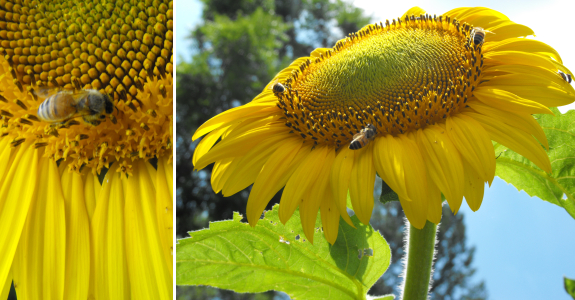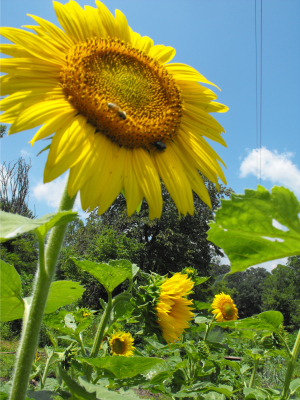
Sunflowers and pollinators

 I'm
not sure why no one talks about planting sunflowers for their honeybees
--- our bees adore them. We put in two beds of oilseed sunflowers
so that we could experiment with pressing
our own oil this
fall, but the flowers have already paid for themselves by feeding local
pollinators.
I'm
not sure why no one talks about planting sunflowers for their honeybees
--- our bees adore them. We put in two beds of oilseed sunflowers
so that we could experiment with pressing
our own oil this
fall, but the flowers have already paid for themselves by feeding local
pollinators.
During the day, it's not
at all unusual to catch several honeybees on
the same flower head, along with lots of smaller pollinators. The
action doesn't even stop when night falls --- yesterday, I snuck out at
dusk and found a moth on every flower, each dipping its proboscis deep
into the tiny florets opening around the circumference of the sunflower
head.
On a semi-related note,
if you're interested in native
pollinators and have
a bit of time on your hands, you might want to check out the Great
Sunflower Project.
Just plant a Lemon Queen Sunflower seed, watch the pollinators flock to
your flower for 15 minutes, and input your data to help scientists
figure out how pollinator populations are doing in your area. I
suspect this project would be especially good for science-oriented kids.
Want more in-depth information? Browse through our books.
Or explore more posts by date or by subject.
About us: Anna Hess and Mark Hamilton spent over a decade living self-sufficiently in the mountains of Virginia before moving north to start over from scratch in the foothills of Ohio. They've experimented with permaculture, no-till gardening, trailersteading, home-based microbusinesses and much more, writing about their adventures in both blogs and books.
Want to be notified when new comments are posted on this page? Click on the RSS button after you add a comment to subscribe to the comment feed, or simply check the box beside "email replies to me" while writing your comment.

We plant tons of sunflowers every year. I don't have a hive myself yet, but the sunflowers are popular for getting the "wild" pollinators into the yard and garden.
Mostly though, I plant them for the chickens. In the fall, we cut them and hang them to dry, and then, through the winter, when the chickens don't have much else to do, and they might be prone to start pecking each other from boredom, I hang them just up above head height, so they have to stretch to peck them, and they swing a bit. The seeds fall out and they all run them down, and then start again with another peck. Gives them something to do.
Josh --- I don't know that anyone goes to the trouble of making sunflower honey. I suspect it mixes into the late summer wildflower honey, which tends to be dark honey with a slightly stronger taste than the pale spring and early summer honeys (basswood, clover, etc.)
Bethany --- I've read a lot about how good sunflowers are for chickens --- I'm glad to hear from someone who has tried it first hand! If all goes well with our oil experiment, we'll feed the pulp to the chickens. If the oil pressing doesn't work easily, we'll just set it all aside as chicken feed. And will plant more next year!! Do you have any trouble with birds stealing your ripening sunflower seeds?
Yes, some. The big black birds like to perch on them and eat. I think we end up losing more on the ground that way than to the birds, but it's still annoying.
I tried two things about that last year. I put paper bags on a couple of them to keep birds off and catch the seeds as the heads curled back and the seeds came loose. That worked, but I don't know if it's really worth the trouble.
I also tried just picking them a little early. I waited till the flower part had died, but before the center was curling back and the seeds were really loose, then cut them and hung them up to dry. That seemed to work really well, and I didn't have the trouble with lots of seeds falling all over the way I did with the ones I let stay on the plant till they curled back. After they were all the way dried out, they loosened in the head a bit, so the chickens could still enjoy knocking a few down at a time, but that they didn't all just come spraying out at the first peck. That way each one kept them amused a little longer too.
For oil production though, I don't know what the best picking time is, so maybe that would make a difference?